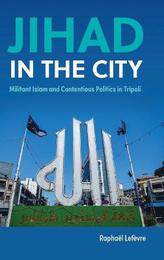
|
Jihad in the City: Militant Islam and Contentious Politics in Tripoli
Hardback
Main Details
| Title |
Jihad in the City: Militant Islam and Contentious Politics in Tripoli
|
| Authors and Contributors |
By (author) Raphael Lefevre
|
| Physical Properties |
| Format:Hardback | | Pages:288 | | Dimensions(mm): Height 150,Width 230 |
|
| Category/Genre | Islam |
|---|
| ISBN/Barcode |
9781108426268
|
| Classifications | Dewey:320.557095692 |
|---|
| Audience | | Professional & Vocational | | Tertiary Education (US: College) | |
|---|
| Illustrations |
Worked examples or Exercises
|
|
Publishing Details |
| Publisher |
Cambridge University Press
|
| Imprint |
Cambridge University Press
|
| Publication Date |
6 May 2021 |
| Publication Country |
United Kingdom
|
Description
Tawhid was a militant Islamist group which implemented Islamic law at gunpoint in the Lebanese city of Tripoli during the 1980s. In retrospect, some have called it 'the first ISIS-style Emirate'. Drawing on two hundred interviews with Islamist fighters and their mortal enemies, as well as on a trove of new archival material, Raphael Lefevre provides a comprehensive account of this Islamist group. He shows how they featured religious ideologues determined to turn Lebanon into an Islamic Republic, yet also included Tripolitan rebels of all stripes, neighbourhood strongmen with scores to settle, local subalterns seeking social revenge as well as profit-driven gangsters, who each tried to steer Tawhid's exercise of violence to their advantage. Providing a detailed understanding of the multi-faceted processes through which Tawhid emerged in 1982, implemented its 'Emirate' and suddenly collapsed in 1985, this is a story that shows how militant Islamist groups are impacted by their grand ideology as much as by local contexts - with crucial lessons for understanding social movements, rebel groups and terrorist organizations elsewhere too.
Author Biography
Raphael Lefevre is a Senior Research Fellow in the Department of Politics and International Relations at the University of Oxford. He is the author of Ashes of Hama: the Muslim Brotherhood in Syria (2013). His PhD thesis was awarded the Best Dissertation Prize by the Syrian Studies Association as well as the Bill Gates Sr Prize. He was previously a Research Fellow at the Carnegie Endowment for International Peace's office in Beirut, where he published on Middle Eastern politics and Islamist movements.
Reviews'A uniquely rich and original book likely to become a classic in the study of Islamism. Jihad in the City takes the reader deep into the alleyways of Tripoli to show that, sometimes, it's the most fine-grained local analyses that yield the sharpest global insights.' Thomas Hegghammer, University of Oslo 'As a term, Islamism is simultaneously broad and vague. Raphael Lefevre relies on the findings of his fascinating field study in Lebanon to track the evolution of an Islamist movement, highlighting the complex intersection of individual motivations, space, and ideology. A must-read for students of social movements and political Islam.' Stathis N. Kalyvas, University of Oxford 'A sheer pleasure to read. No one should approach this book as 'just' about a city few outsiders know and that is neglected by its own local elite and central government. Rather, it is bursting with granular insight into the role of 'ideological entrepreneurs' and 'champions of mobilization' that holds true for understanding contentious politics anywhere. The seemingly effortless ease with which Lefevre moves from the local - indeed, the micro-local - to the wider field of social movement theory both reveals and addresses its gaps and shortcomings. This is fieldwork at its best.' Yezid Sayigh, Malcolm H. Kerr Carnegie Middle East Center 'Lefevre's Jihad in the City is an important and original contribution to a literature that has become saturated with familiar typologies, arguments, and analytical biases. This book compellingly takes us back to something unfamiliar so we can explore with fresh eyes a phenomenon in its formative stages, helping us crystalize the microprocesses of Islamism taking shape in its physical, social, and symbolic space.' Mohammed M. Hafez, Terrorism and Political Violence
|